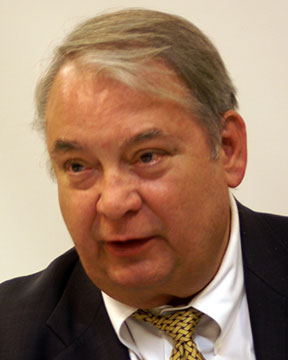Fray International Sustainability Award
About Award Winners
Politics |
Corporations |
Academia |
Research Institutions
Prof. Ferid Murad

Prof. Ferid Murad, is a Biochemist best known for his 1977 pioneering discovery work on nitric oxide and its role in increasing the diameter of the cardiovascular and other blood vessels for which he was awarded Nobel Prize in Medicine in 1998 along with Robert F. Furchgott and Louis J. Ignarro. The Nobel Committee evaluated that the identification of a biological role for nitric oxide was surprising for several reasons. Nitric oxide was known before the discovery mainly as a harmful air pollutant, released into the atmosphere from automobile engines and other combustion sources. In addition, it was a simple molecule, very different from the complex neurotransmitters and other signaling molecules that regulate many biological events. No other gas is known to act as a signaling molecule in the body. In addition to its use in cardiovascular drugs the work of Prof. Murad on nitric oxide led to the development of Viagra. Nitric oxide is the only gas known to act as a signaling molecule in the body, and regulates activities of the brain, intestines, kidneys, liver, lungs, stomach, and genitals. Prof. Ferid Murad, attended DePauw University (1958), Western Reserve University (1965), and performed his internship and residency in medicine at Massachusetts General Hospital as and MD/PhD physician scientist. He worked as a clinical associate in the Heart Institute from 1967-70 at the National Institutes of Health. From 1970-1981, Prof. Murad was on the faculty at the University of Virginia, where he developed a new Clinical Pharmacology Division in the Department of Medicine as an Associate Professor in Medicine and Pharmacology. In 1981, he was appointed as Chief of Medicine of the Palo Alto Veterans Hospital, a Stanford-affiliated hospital. He also served as a Professor of Medicine and Pharmacology and the Associate Chairman of Medicine. Prof. Murad was acting Chairman of Medicine at Stanford University from 1986-1988. In 1988, Dr. Murad joined industry as Vice President at Abbott Laboratories, supervising approximately 1,500 scientists and staff. In 1993, he founded and served as President and CEO of Molecular Geriatrics Corporation. In April 1997, he joined the University of Texas-Houston as their first chairman of a newly-combined basic science department, Integrative Biology, Pharmacology and Physiology. There he also created a new Division of Clinical Pharmacology with his department and the Department of Medicine. In October 1998, Prof. Murad, along with his colleagues Robert F. Furchgott and Louis J. Ignarro, were awarded The Nobel Prize in Physiology or Medicine. The award was given to them for their discoveries concerning nitric oxide as a signaling molecule in the cardiovascular system specific to blood vessel dilation. After accepting the award, Dr. Murad began working in the dual role of Chairman of the Department of Integrative Biology, Pharmacology and Physiology and Director of the Institute of Molecular Medicine at the University of Texas-Houston. In 2011, Dr. Murad accepted an faculty appointment at The George Washington University, where he leads a lab program in the Department of Biochemistry and Molecular Biology. Prof. Murad has been recipient of many Awards including the Albert Lasker Basic Medical Research Award in 1996 for his discovery. He is author of two books: Nitric Oxide: Biochemistry, Molecular Biology, and Therapeutic Implications (1995, with Louis J. Ignarro) and The Wellness Solution (2007, with Edward A Taub and David Oliphant). As a Nobel Laureate, Dr. Murad has participated on panels with other Nobel Laureates to discuss methods to promote peace and education around the world.
Full biography: https://www.nobelprize.org/prizes/medicine/1998/murad/biographical/